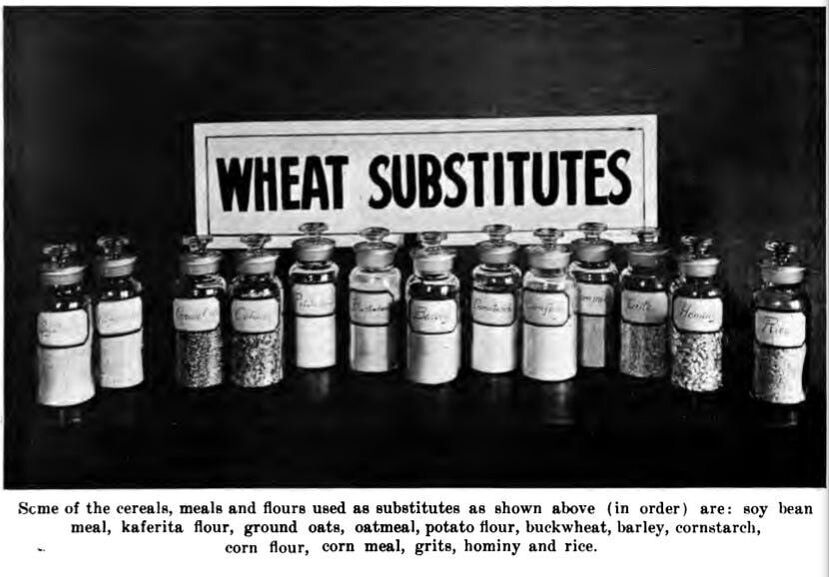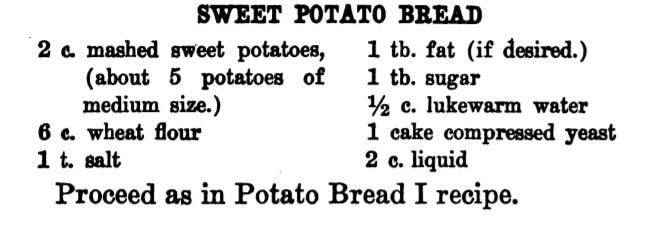 "Wheat Substitutes" as illustrated in "Liberty Recipes" (1918). Caption: "Some of the cereals, meals and flours used as substitutes as shown above (in order) are: soy bean meal, kaferita flour, ground oats, oatmeal, potato flour, buckwheat, barley, cornstarch, corn flour, corn meal, grits, hominy, and rice." Last time for World War Wednesday, we discussed how important it was during the First World War to save wheat and reduce bread consumption. During the war a number of cookbooks were published to help Americans reduce their consumption of wheat, meat, butter, and sugar and how to go without or reduce the use of scarce or expensive ingredients like eggs. When it came to bread, there were very few recipes that used no wheat flour at all, but instead most recipes used alternative grains like barley, rye, corn, and oatmeal or other ingredients like mashed potatoes or cooked rice to reduce the overall ratio of wheat flour used. Liberty Recipes was written by Amelia Doddridge, who the title page lists as "Formerly, Instructor of Cooking, Manual Training High School, Indianapolis, Indiana; and Emergency City Home Demonstration Agent, Wilmington, Delaware. Now, Head of Home Economics Department, Wooster College, Wooster, Ohio." The book was published by Stewart & Kidd Company in Cincinnati, Ohio in 1918. I wasn't able to find much more on Amelia herself. I found a dissertation that notes that several classes in food and household management at Wooster College were taught by Amelia, who was then Acting Dean of Women. But those classes were apparently only offered temporarily during the war, "These particular classes were offered only between 1918-1919 during the "confused period of war, fuel shortages, S.A.T.C., Spanish flu, and demobilization." Which seems to indicate that Amelia herself may not have survived as an instructor after the war. A reference from 1922 places an Amelia Dodderidge in Montevallo, Alabama as head of the home economics department "at Montevallo," which possibly meant the college located there. I found a reference to an Amelia Doddridge teaching high school home economics in Ohio in 1924. And another to an Amelia Dodderidge working at a Farm Bureau in Pennsylvania and/or as a county home economics representative, and/or as the Home Economics Extension representative from the state college, all in Pennsylvania, all in 1926. In 1929 there's a Miss Amelia Dodderidge in Modesto, California, acting as an "assistant home department agent." By the 1950s she appears to be living, retired, in Franklin, Indiana and throughout the late 1950s and 1960s there are numerous articles in the Franklin Star authored by Amelia Dodderidge. A 1962 article indicates she was working for the Methodist Home (likely a home for the elderly) in Franklin, IN and, indeed, most of the articles she published in the Franklin Star were called "The Home Window," apparently reporting on the activities and events of the Methodist Home. The trail runs cold at the very end of 1963. The last reference to Amelia is published on December, 31. It's unclear whether the newspaper simply did not run her column again or if the newspaper itself ceased publication or if it simply wasn't digitized past 1963. Although it's tough to prover all these Amelia Dodderidges were the same person, it is very likely. Amelia apparently continued her home economics work throughout her life, even after "retirement." But back to Liberty Recipes. The cookbook is a fascinating one, and I particularly love some of the slogans listed in the frontspiece; my two favorites are "Place meat and buns behind the guns" and "Husband your stuff; don't stuff your husband." Also interesting are the references in the foreword to the cookbook itself being much more convenient for reference by housewives rather than taking "too much trouble to hunt in a pile of leaflets for the recipes she wishes at the particular time she needs it" - a reference to the numerous bulletins and cookbooklets being published by the USDA and other government agencies. In addition, the foreword claims that although the recipes listed are designed for the "present emergency," "they should be usable and still practical even after the war clouds pass and Freedom is ours." There are numerous bread recipes in the cookbook - both yeast and quick breads. In addition, the cookbook focuses on meatless and meat-saving recipes, a few salads, and numerous sugarless, low-sugar, and wheat- and fat-saving dessert recipes. This recipe for Sweet Potato Bread seemed quite modern, and a fun recipe to share in the lead-up to Thanksgiving. Although I have not had time in a while to bake yeast bread, I thought I would share it anyway. Maybe I can take a stab over the holiday. World War I Sweet Potato Bread (1918)The original recipe makes references to other recipes, so I've combined the instructions for your convenience. A cake of yeast is about the same as dried yeast packets that are sold today. Although you can try it with RediRise or similar fast-acting yeast, I recommend plain ol' active dry yeast. 2 cups mashed sweet potatoes (about 5 potatoes of medium size.) 6 cups wheat flour 1 teaspoon salt 1 tablespoon fat (if desired.) 1 tablespoon sugar 1/2 cup lukewarm water 1 cake compressed yeast (or 1 envelope active dry yeast) 2 cups liquid Use the potato water for the liquid. Pour it gradually over the hot mashed potatoes. When lukewarm add the softened yeast, salt, sugar, and fat. Stir in the rest of the flour gradually. When the dough becomes too stiff to stir, work in the remainder of the flour by kneading with the hands. It may take a little more flour or a little less depending upon the kind of flour used. The dough should be of such a consistency that it will not stick to the hands or to the bowl. Knead 10 or 15 minutes until the dough is smooth and elastic. Place in a bowl, cover, and keep it in q warm temperature (75 to 85 F). When risen twice its bulk, cut down and knead again. Then shape into loaves, place in greased pans, and set in a warm place. When light and doubled in bulk it is ready to bake. To prevent a crust from forming over the top of the loaf while rising, rub the surface with a little melted fat. Watch the rising and put into the oven at the proper time. If risen too long, it will make a loaf full of holes; if not risen enough, it will make a heavy bread. Bake 45 minutes to 1 hour in a moderately hot oven (375 to 400 F). If oven is too hot, the crust will brown before the heat has reached the center of the loaf and will prevent further rising. The loaf should raise well during the first 15 minutes of baking; then it should begin to brown, and continue browning for the next 15 or 20 minutes. The last 15 to 30 minutes, it should finish baking and the heat may be reduced. When done, the bread will not cling to the sides of the pan. If a tender crust is desired, brush the bread over with a little melted fat as soon as it is taken from the oven. If you end up making this recipe, let us know in the comments how it turned out! There are lots of other interesting recipes to be had in Liberty Recipes, including a potato biscuit pie crust recipe, buckwheat spice cake, and cornmeal gingerbread, to name a few! Are there any recipes in there that you want to try? The Food Historian blog is supported by patrons on Patreon! Patrons help keep blog posts like this one free and available to the public. Join us for awesome members-only content like free digitized cookbooks from my personal collection, e-newsletter, and even snail mail from time to time! Don't like Patreon? Join with an annual membership below, or just leave a tip!
0 Comments
Your comment will be posted after it is approved.
Leave a Reply. |
AuthorSarah Wassberg Johnson has an MA in Public History from the University at Albany and studies early 20th century food history. Archives
July 2024
Categories
All
|


 RSS Feed
RSS Feed